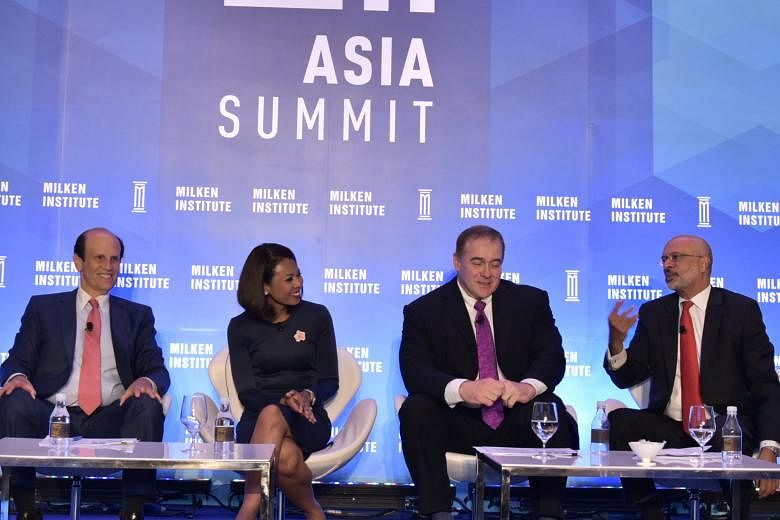China's slowdown and global share market volatility may knock 1 per cent to 1.5 per cent off Asia's growth over the next two years, but long-term prospects are still bright, said experts at a forum yesterday.
DBS chief executive Piyush Gupta told the Milken Institute Asia Summit at the Four Seasons hotel that China's "transition from a controlled economy to a market economy is not simple". So as China changes, some volatility is to be expected, he added, noting that the rest of the year will be a "very choppy" one for market investors.
Mr Scott Minerd, global chief investment officer of investment and advisory firm Guggenheim Partner, pointed out that quantitative easing in the United States has resulted in the devaluation of currencies across different countries and, most recently, of the Chinese yuan.
He said that until the equities and currency markets are "fundamentally revalued", the system will remain fragile and prone to swings.
"(It) will maintain a volatility that is making many investors sceptical about putting capital to work," he added. But beyond the short-term "idiosyncratic risks" as China reforms economically and socio-politically, Mr Gupta is optimistic about the opportunities that these changes will bring to the region and the world five years from now.
He also remains upbeat about the outlook for Asia.
The mega trends of a huge population, a growing middle class, as well as the demand for infrastructure development and investment driving growth are unlikely to change in the medium term, Mr Gupta noted.
The impact of China may slow Asia's growth to 5 per cent, down from the current levels of 6 per cent to 6.5 per cent, but "that is still a lot of growth", he added.
The two-day Asia Summit, which opened yesterday and is in its second year, has attracted 400 chief executives, investors and business leaders to discuss pressing global challenges, with a focus on Asia. Panel topics include discussions on China, India, Indonesia and Japan.
Institute chairman Michael Milken believes that the rise of a growing middle class will keep China and the rest of Asia growing.
And given the way the Chinese have invested significantly in the education of their children, the country has laid the groundwork to allow it "to move into a consumption society, away from a manufacturing society", he added.
Developing human capital will be key to the growth of Asian economies, so as long as Asian countries continue to focus on education, they will be able to adapt to the volatility, added Mr Milken.
"Tomorrow will be the best day in history, for more than 50 per cent of the people in China, and the people in the world," he added.


